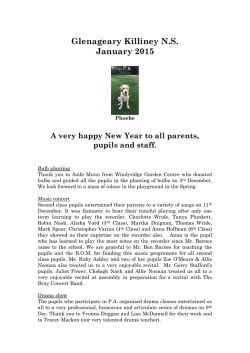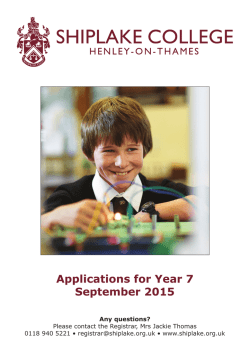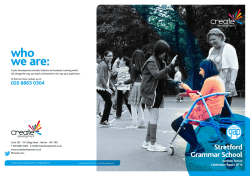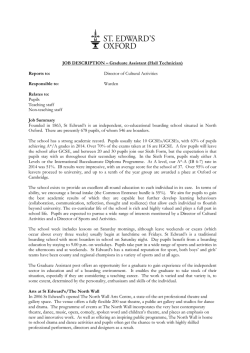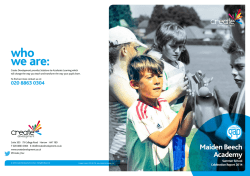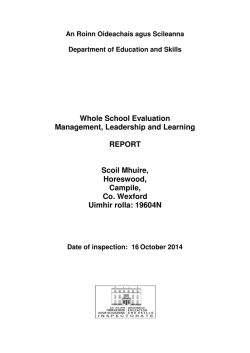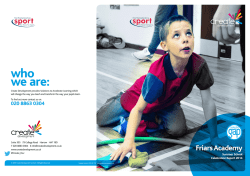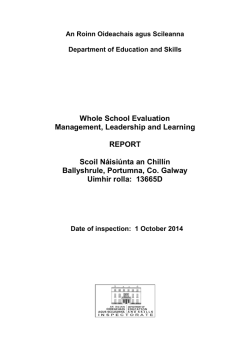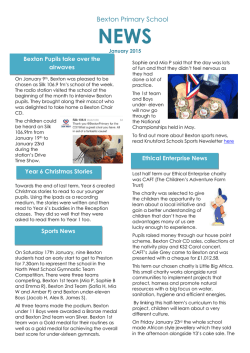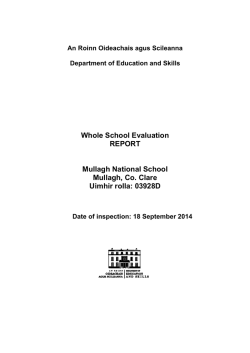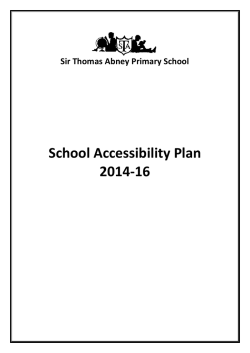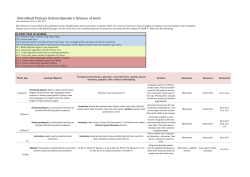
Whole School Evaluation Management, Leadership and Learning
An Roinn Oideachais agus Scileanna Department of Education and Skills Whole School Evaluation Management, Leadership and Learning REPORT Scoil Náisiúnta an Droma Ballinakill, Loughrea, Co. Galway Uimhir rolla: 17331R Date of inspection: 17 September 2014 Whole-School Evaluation – Management, Leadership and Learning Report Introduction A Whole-School Evaluation – Management, Leadership and Learning (WSE - MLL) was undertaken in Scoil Náisiúnta an Droma in September 2014. This report is based on a selection of lessons observed in a range of learning settings in the school, interaction with pupils and review of their work, meetings with the principal and with board and parent representatives, completed parent and pupil questionnaires, and a selection of school documents. The board of management of the school was given an opportunity to comment in writing on the findings and recommendations of the report, and the response of the board will be found in the appendix of this report. Scoil Náisiúnta an Droma is a rural primary school under Catholic patronage, located in the parish of Ballinakill/Derrybrien in south east Galway. The attendance levels of the majority of pupils are very good. The school has strengths in the following areas: • • • • • • • The teachers have a commendable work ethic, a commitment to ongoing professional development, and co-operate effectively to provide a holistic education in a safe, pleasant and inclusive environment. The principal provides effective and conscientious leadership to the school. The board of management supports the work of the school in a competent and professional manner. The school building, grounds and resources have been developed and are maintained to a very high standard. Pupils’ positivity towards school is reflective of teachers’ efforts to deliver a broad, balanced and interesting curriculum. Parents support the school enthusiastically and their responses to questionnaires indicate high levels of satisfaction with a wide range of school related issues. The majority of pupils achieve well in standardised tests with particular strengths in mathematical attainment. The following main recommendations are made: • • As part of an integrated language process, the school should examine possibilities for more effective oral language instruction and place greater emphasis on language across the curriculum. The school’s assessment policy should be reviewed to ensure that maximum benefit is derived from the outcomes of standardised and other tests, to facilitate target setting for improvement and to assist in the ongoing assessment of pupils’ progress. Findings 1. The learning achievements of pupils • The overall learning achievements of pupils range from good to very good. Analysis of the results of standardised tests in literacy and numeracy indicate that interventions already in place have effected improvements in standards. In Mathematics, overall standards are particularly good and would appear to have improved as a result of the implementation of particular strategies geared towards mental maths and problem solving. In English the pupils have good phonic skills, their comprehension skills are developing well and standards of neatness and handwriting are impressive. • Cloistear an Ghaeilge go minic i ngnáthchumarsáid laethúil na scoile. Is díol spéise é an réimse leathan rainn is amhráin atá de ghlanmheabhair ag na daltaí. Glacann siad páirt go fonnmhar i gcluichí teanga taitneamhacha as Gaeilge. Moltar triail chaighdeánach a riar chun tuilleadh eolais a bhailiú ar an dul chun cinn sa Ghaeilge. (Irish is heard frequently in daily school communication. The significant repertoire of songs and rhymes learned off by the pupils is noteworthy. They participate willingly in enjoyable Irish language games. The use of a standardised test to gather more information on progress in Irish is recommended.) • Pupils engage enthusiastically with a broad range of learning experiences which have an environmental focus. Attractively presented project work based on field trips and the Green Schools programme exemplify these experiences. Pupils are adept at completing tasks independently. • Pupils with special educational needs are making good progress in their learning. 2. Quality of teaching • The overall quality of teaching in the school ranges from good to very good. The teachers are highly skilled communicators and manage talk and discussion very well. They make commendable efforts to use a wide range of approaches and methodologies and to provide rich and suitably challenging learning experiences. Lessons observed in Social Environmental and Scientific Education (SESE) featured purposeful cross-curricular integration. • The teachers are implementing a range of initiatives to improve reading fluency and efforts to have pupils pursue individualised reading programmes are already showing positive outcomes. A concerted effort is being made to have pupils experience a broad range of writing genres. Pupils have been encouraged to write independently through participation in the Write-a-Book project. In order that literacy provision may be further enhanced it is recommended that there be a greater focus on vocabulary extension, open and higher order questioning, and giving pupils more opportunities to develop listening and speaking skills in collaborative situations. • Play in the junior room is well organised and resourced. In order to gain more benefit from pupils’ play experiences, consideration should be given to implementing the Aistear curriculum framework. • Teaching observed in support settings was well prepared and delivered with a strong sense of care and empathy. • Assessment is an integral part of the teaching and learning process in the school. A range of standardised tests is administered and pupils’ work is very carefully monitored. It is recommended that assessment practices be enhanced to ensure more in-depth analysis of test outcomes, and judicious use of diagnostic tests to determine which interventions are necessary, particularly in supporting pupils with special educational needs. 3. Support for pupils’ well-being • The pupils are managed very well. Their teachers prioritise affirmation, encouragement and inclusion in their daily interactions with the pupils. The learning environment is well ordered, well resourced and attractive. • Analysis of questionnaires administered to pupils provide evidence of pupils’ very positive attitudes towards their schooling. From similar questionnaires and from meeting with parents’ representatives, it is clear that all parents feel they are welcome in the school, that the school is well run and that they are well informed as to their children’s progress. • Pupils with special educational needs are cared for with great sensitivity. In this regard, all pupils are encouraged to take responsibility for ensuring that pupils with such needs are included meaningfully in the broad spectrum of school activities. • Confirmation was provided that the board of management has formally adopted the Child Protection Procedures for Primary and Post-Primary Schools without modification and that the school is compliant with the requirements of the Child Protection Procedures for Primary and Post-Primary Schools. 4. Leadership and Management • The school has an active, efficient and supportive board of management. Individual members use their particular skills to good effect in the service of the school. Thorough records, prudent management of resources and careful adherence to statutory and regulatory guidelines are testament to the careful management of the board. To enhance this work further the board should consider issuing agreed reports after meetings. • The school has a very experienced and dedicated principal. She is well supported by the deputy principal and together they co-operate effectively in sharing the in-school management workload and in the promotion of various initiatives geared towards improving learning outcomes. 5. School Self-evaluation • Engagement with the school self-evaluation process has been earnest and productive. The teachers have effectively drawn on the views of parents, pupils and staff, compiled a report of these deliberations and set forth key interventions in literacy and numeracy. The school should ensure that targets are realistic and that progress towards these targets is appropriately monitored. Conclusion The school’s capacity to engage in school improvement is very good. Published January 2015 Appendix SCHOOL RESPONSE TO THE REPORT Submitted by the Board of Management Area 1 Observations on the content of the inspection report The Board of Management of Scoil Náisiúnta an Droma (Drim N.S.) welcomes this very positive report, particularly its affirmation of the high standard of teaching and learning in the school, the commendable work ethic of the teachers, the competent and professional manner in which the Board of Management supports the work of the school and the high levels of satisfaction from the parent body which was evident from responses to questionnaires. The Board of Management acknowledges that analysis of questionnaires administered to pupils provide evidence of pupils’ very positive attitudes towards their schooling. Area 2 Follow-up actions planned or undertaken since the completion of the inspection activity to implement the findings and recommendations of the inspection. The Board of Management and teachers will continue to work closely together to implement the recommendations in this report. Since the completion of the inspection, the teachers have reviewed the oral language component of the English curriculum and are now more aware of giving pupils more opportunities to develop listening and speaking skills in collaborative situations. The school’s assessment policy has been reviewed and additional standardised tests in Early Literacy and Early Numeracy have been purchased. Ceannaíodh freisin Triail Ghaeilge Dhroim Conrach do Bhunscoileanna Rialta chun tuilleadh eolais a bhailiú ar an dul chun cinn sa Ghaeilge. The recommendations in this report will inform the continuing process of self-evaluation and future planning in the school.
© Copyright 2026
